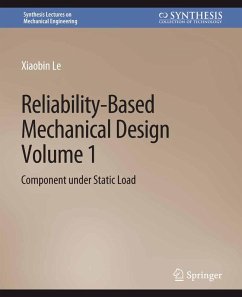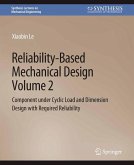A component will not be reliable unless it is designed with required reliability. Reliability-Based Mechanical Design uses the reliability to link all design parameters of a component together to form a limit state function for mechanical design. This design methodology uses the reliability to replace the factor of safety as a measure of the safe status of a component. The goal of this methodology is to design a mechanical component with required reliability and at the same time, quantitatively indicates the failure percentage of the component. Reliability-Based Mechanical Design consists of two separate books: Volume 1: Component under Static Load, and Volume 2: Component under Cyclic Load and Dimension Design with Required Reliability. This book is Reliability-Based Mechanical Design, Volume 1: Component under Static Load. It begins with a brief discussion on the engineering design process and the fundamental reliability mathematics. Then, the book presents several computational methods for calculating the reliability of a component under loads when its limit state function is established. Finally, the book presents how to establish the limit state functions of a component under static load and furthermore how to calculate the reliability of typical components under simple typical static load and combined static loads. Now, we do know the reliability of a component under static load and can quantitively specify the failure percentage of a component under static load. The book presents many examples for each topic and provides a wide selection of exercise problems at the end of each chapter. This book is written as a textbook for junior mechanical engineering students after they study the course of Mechanics of Materials. This book is also a good reference book for design engineers and presents design check methods in such sufficient detail that those methods are readily used in the design check of a component under static load.
Dieser Download kann aus rechtlichen Gründen nur mit Rechnungsadresse in A, B, BG, CY, CZ, D, DK, EW, E, FIN, F, GR, HR, H, IRL, I, LT, L, LR, M, NL, PL, P, R, S, SLO, SK ausgeliefert werden.
Hinweis: Dieser Artikel kann nur an eine deutsche Lieferadresse ausgeliefert werden.









